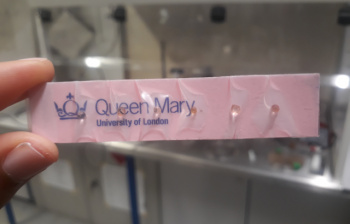News
Researchers develop new smell test for Parkinson's, Alzheimer's and COVID-19
28 April 2021

A new smell test developed by Queen Mary University of London researchers has been found to be easy to use in patients with Parkinson’s disease, and could also be helpful in diagnosing COVID-19 in the broader population.
Smell tests have the potential to support the diagnosis of certain neurological conditions, including Parkinson’s and Alzheimer’s. Unfortunately, these tests are not widely available, expensive, and take too long to administer in routine healthcare settings.
To address this problem, the team developed a novel smell testing kit which uses capsules of aromatic oils placed between two strips of single-sided tape.
To take the smell test, the capsules are simply crushed between the fingers and the tape strip peeled to release the aroma contained within the capsules. Based on a person’s ability to recognise these smells, a score would be generated that can be sent to their GP if they are experiencing a loss of smell.
Lead researcher Dr Ahmed Ismail from Queen Mary’s School of Engineering and Materials Science, said: “Our capsule-based smell test can assist in the rapid diagnostic of various diseases linked to the loss of smell. These include chronic neurological conditions such as Parkinson’s and Alzheimer’s disease, as well as Covid-19, which is known to affect the sense of smell.
“Being non-invasive and less stressful, the capsule-based smell test has benefits over the nose swab in diagnosing Covid-19. This is an advantage for testing children in particular, as they are typically horrified if they need to do a nose swab, and the test can be done in the comfort of their own home.”
The study, published in the journal Royal Society Interface, showed that, in a small group of eight patients with Parkinson’s disease, the smells from the tests were detectable. The participants also cited the relative ease process of rupturing the capsules, particularly for those with tremors, compared to the standard scratch and sniff smell test available on the market.
Dr Ismail added: “Most of the smell tests on the market depend on using paperboard items treated with a fragrant coating called scratch and sniff, in which you need to scratch a card to release the odour. The problem with this approach is that the amount of odour released depends on the extent to which the individual scratches, something that might affect the outcome of the test.
“Our capsule-based smell test doesn’t have this problem because the amount of odour released is controlled by the amount of oil precisely encapsulated. The mass-production of our new test would also be cheaper than a scratch and sniff test.”
| Website: | |
| People: | Ahmed ISMAIL |
| Research Centre: | Bioengineering |




